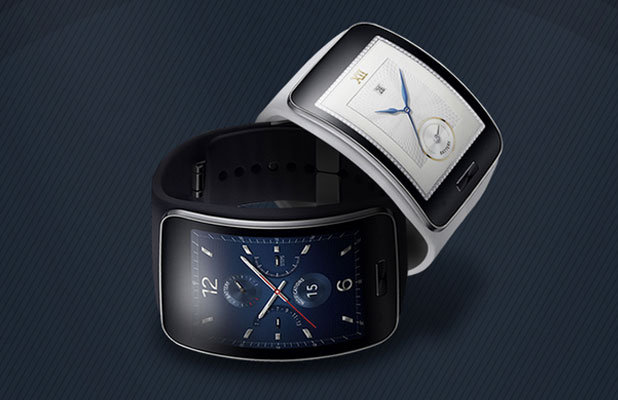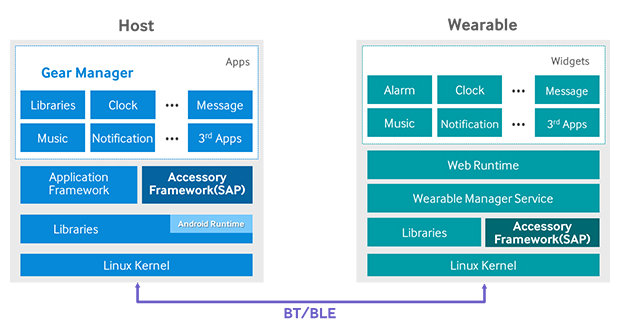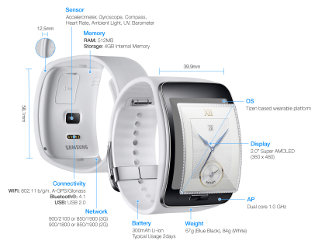Albeit Tizen struggle in the smartphone market widely reported by the tech press, devices from cameras to smartwatches, all made by Samsung, are currently selling with the new mobile operating system. Announced about two weeks ago, Samsung Gear S is the latest Tizen product launched by the company. The smartwatch features a 2″ curved display (Samsung likes curved displays), Bluetooth, Wi-Fi, etc.. and it can also make phone calls and access the internet over 2G/3G cellular networks.
 Samsung Gear S specifications:
Samsung Gear S specifications:
- SoC – Dual core processor @ 1.0 GHz (Maybe Exynos 3250 like in Gear 2?)
- System Memory – 512MB
- Storage – 4GB internal storage
- Display – 2.0” Super AMOLED touchscreen display with 360×480 resolution
- Connectivity – WiFi 802.11 b/g/n, Bluetooth 4.1, A-GPS/Glonass
- Cellular Network
- 900/2100 or 850/1900 (3G)
- 900/1800 or 850/1900 (2G)
- USB – micro USB 2.0
- Audio Codecs – MP3/AAC/AAC+/eAAC+
- Audio Formats – MP3, M4A, WMA, AAC, OGG
- Sensors – Accelerometer, Gyroscope, Compass, Heart Rate, Ambient Light, UV, Barometer
- IP Rating – IP67 Certified Dust and Water Resistant
- Battery – 300mAh Li-ion (good for about 2 days on a charge)
- Dimensions – 39.9 x 58.1 x 12.5mm
- Weight – 67g (Blue Black), 84g (White)
Contrary to most other (Western) smartwatches, Gear S can be used standalone to access the internet, make calls, send SMS, etc.. so it’s not only designed as a smartphone companion. The screen is larger than the previous Gear models, and apparently large enough to fit a QWERTY keyboard (Flesky), but you can always use voice recognition (S Voice) if typing on a tiny screen is not your thing. With GPS, an heart rate monitor, and other sensors, it should also be a decent platform for fitness applications, and the watch indeed includes S Health and Nike+ Running apps for Tizen.
Engadget (and others) could try out the smartwatch at IFA 2014.
The watch should become available later this year, but the price has not been disclosed yet.
Samsung and Tizen have also recently released the Tizen SDK for Wearables 1.0.0 Beta3, which includes a set of tools for developing Tizen wearable applications, namely the Tizen wearable IDE, Emulator, tool-chain, sample applications, and documentation. The Tizen SDK for Wearable runs on Windows®, Ubuntu, and Mac OS X.

But if you want to develop and publish apps specifically for Samsung devices, you can visit Samsung Gear developer site for details, where you’ll also find Samsung Accessories SDK, documentation and tutorials. Host side (smartphone / tablet) apps can be developed using the standard Android development tools (e.g. Android Studio), and only Wearables apps require the Tizen SDK for wearables.
The Tizen SDK provides the following API and features:
- Enhanced Standalone Features – Network, call and location-based APIs to take advantage of the fact that the Samsung Gear S can connect directly to 3G networks without the need for a separate mobile device.
- New Sensor APIs – Magnetic, Ambient Light, Barometer, and UV sensor APIs as well as Accelerometer and Gyroscope APIs.
- Rich Notifications – Create a variety of notifications for the Samsung Gear S.
The Accessories SDK is used to transfer data between devices, for example for messages, data, and files transfers between a GALAXY device and a Gear device.
You can read Samsung’s Tizen SDK announcement for some details, a non-exhaustive list of apps already ported to Tizen for wearables.

Jean-Luc started CNX Software in 2010 as a part-time endeavor, before quitting his job as a software engineering manager, and starting to write daily news, and reviews full time later in 2011.
Support CNX Software! Donate via cryptocurrencies, become a Patron on Patreon, or purchase goods on Amazon or Aliexpress





